Faculty 2018 Summer Reading List
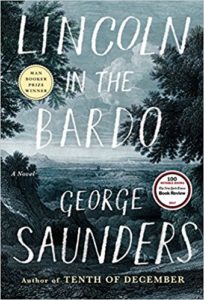
Janet Cooper Alexander, Frederick I. Richman Professor of Law, Emerita recommends Grant by Ron Chernow, The Color of Law by Richard Rothstein, Back Channel to Cuba by Wiliam LeoGrande and Peter Kornbluh and Lincoln in the Bardo by George Saunders
“Grant by Ron Chernow: a wonderful biography that places slavery and racism at the center of understanding the Civil War, Reconstruction, and Grant.
“The Color of Law, by Richard Rothstein: a meticulous examination of how residential segregation, far from being the product of individual choice and thus the immovable obstacle to racial equality, is the product of decades of concerted action by federal, state and local governments.
“Back Channel to Cuba, by William LeoGrande and Peter Kornbluh: fifty years of secret diplomatic negotiations between Cuba and every American administration and their collapse with each change in administration.
“Lincoln in the Bardo, by George Saunders: Lincoln, in the cemetery grieving the death of his son, amid the suffering of the Civil War, observed by a chorus of skittery ghosts. A magnificent collage of a novel, winner of the Man Booker Prize of 2017.”
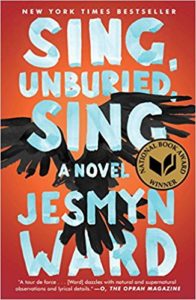
Ralph Richard Banks, Jackson Eli Reynolds Professor of Law recommends Pragmatism: A Reader by Louis Menand, Leonardo Da Vinci by Walter Isaacson, Existentialism and Human Emotion by Jean-Paul Sartre, and Sing, Unburied, Sing by Jesmyn Ward
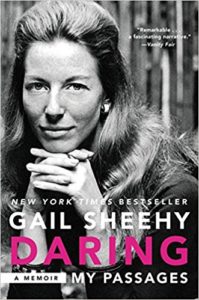
Barbara Babcock, Crown Professor of Law, Emerita recommends Daring: My Passages: A Memoir by Gail Sheehy
“I’m reading biographies and autobiographies of people in or near by own generation. Now in the midst of Gail Sheehy’s Daring: My Passages: A Memoir, about her career as a journalist and writer in NY in the 70’s and -80’s. She writes with admirable honesty, and speaks frankly about things many people would think should be kept private. I’m thinking of writing a second memoir myself and want to speak of the interesting times I lived in, and being part of the second wave of the women’s movement.”
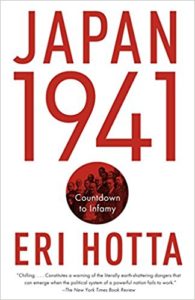
Mariano-Florentino Cuellar, Visiting Professor of Law, recommends Denmark Vesey’s Garden: Slavery and Memory in the Cradle of the Confederacy by Ethan Kytle and Blain Roberts, Japan 1941: Countdown to Infamy by Eri Hotta, An Academic Life: A Memoir by Hanna H. Gray, and The Berlin Project by Gregory Benford
“Ethan Kytle and Blain Roberts, Derek Vesey’s Garden: Slavery and Memory in the Cradle of the Confederacy is an atmospheric, quite riveting account of how Charleston, South Carolina rose to prominence; how the city’s fate was intertwined with the brutal realities of slavery; and how some slaves and their allies worked to undermine the social norms and institutional practices supporting slavery.
“Eric Hotta, Japan 1941, explores the puzzle of why Japan went to war with the United States when so many of its most important military and civilian leaders thought it would lose.
“Hannah H. Gray, An Academic Life: a compelling and at times surprising memoir by the first woman to become president of a major American research university—lots of European intellectual history, but plenty else, too.
“Gregory Benford, The Berlin Project, is historical science fiction full of rich details envisioning what might have happened in history if chemists has been given their due by dismissive physicists in the Manhattan project, and if (as a consequence) the first atom bomb had been dropped on Berlin.
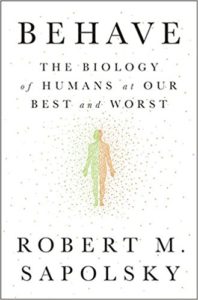
John Donohue, C. Wendell and Edith M. Carlsmith Professor of Law recommends Behave by Robert Sapolsky
“Behave by Stanford biologist Robert Sapolsky who argues ‘that the criminal justice system is staggeringly out of date in incorporating neuroscience into its thinking. As one flagrant example, the gold standard for determining whether someone is so organically impaired that they can’t be held responsible for their criminal actions—the ‘M’Naghten rule’ concerning an inability to tell the difference between right and wrong—is based on the case of a man by that name, almost certainly a paranoid schizophrenic, from the 1840s.’ and ‘the single most important question is how to construct a society that is just, safe, peaceful—all those good things—when people finally accept that there is no free will.’”
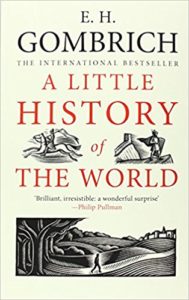
Nora Freeman Engstrom, Professor of Law, Associate Dean for Curriculum and Deane F. Johnson Faculty Scholar recommends A Little History of the World by Ernst Gombrich
“I recommend A Little History of the World by Ernst Gombrich. Especially if you are traveling abroad this summer, this gem of a book will bring the past alive for the elementary or middle school set, and it’s also a great refresher for those of us whose world history classes are too far in the rear-view mirror.”
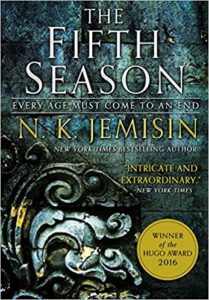
Richard Thompson Ford, George E. Osborne Professor of Law recommends The Broken Earth series by N.K. Jemisin, Looking Good: A Visual Guide to the Nun’s Habit by Lucienne Roberts, Veronica Bennett, and Ryan Todd
“The Broken Earth series by N.K. Jemisin. First rate high end sci-fi/fantasy. There’s nothing else like it in genre, but if I had to make comparisons, I’d say it has the intricately imagined and utterly unique world of Dune, and the elegant, poetic narrative arc of Lord of Rings, the political sensibility of Game of Thrones. Because the author is a black woman it will inevitably be called feminist and ‘Afro-futurist,’ but while there are ‘races’ and sexism in Jeminsin’s universe, this is no simple statement on today’s world. And ultimately identity politics are pretty much beside the point when the world is missing its moon and plagued by constant earthquakes and volcanic eruptions, threatened by disastrous ‘fifth seasons’ that blot out the sun and destroy most of civilization once every century or so, menaced by mysterious floating obelisks and populated by animate stone statues, ‘Guardians’ who can make a human body disintegrate with a touch and a people able to move earth and freeze air with the power of thought. Read it now and get ready for the inevitable HBO series.
“Looking Good: A Visual Guide to the Nun’s Habit a collaboration between a graphic design team and a theologist, this small volume depicts and decodes the surprisingly diverse range of nun’s habits. Fascinating, comprehensive, respectful, and still lots of fun.”
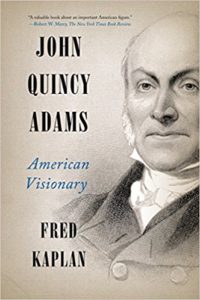
Lawrence Friedman, Marion Rice Kirkwood Professor of Law recommends John Quincy Adams: American Visionary by Fred Kaplan
“I enjoyed Fred Kaplan’s biography, John Quincy Adams, for those with a taste for US history…”
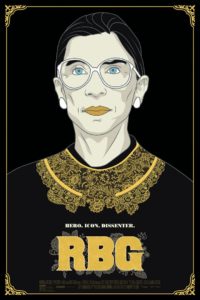
Ronald J. Gilson, Charles J. Meyers Professor of Law and Business, Emeritus recommends the documentary RBG
“I would urge people to see RBG, the wonderful documentary on Ruth Bader Ginsburg. That the movie is worth seeing will come as no surprise to our alumni. But I would suggest that people should pay special attention to the exchange between Orrin Hatch and then Judge Ginsburg during her confirmation hearings. Senator Hatch with elaborate courtesy explained that he disagreed with the Judge’s positions on many things but that she was a substantial person and deserved to be confirmed. The confirmation vote was 93-3. How do we suppose the conversation would go now?”
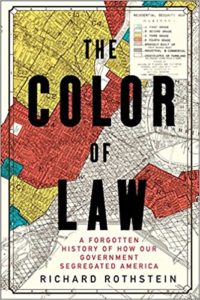
Robert W. Gordon, Professor of Law, recommends The Color of Law: A Forgotten History of How Our Government Segregated America by Richard Rothstein, The Burning House: Jim Crow and the Making of Modern America by Anders Walker, and Castle Gay by John Buchan
“I am trying to understand the extent to which racial ‘integration’ in neighborhoods, education, and occupations — was or was not the actual goal of the civil rights movement and its leaders; and to what extent it remains a goal today, despite many impediments. Two books that have helped clarify these questions for me are:
“Richard Rothstein, The Color of Law: A Forgotten History of How Our Government Segregated America (2017), a detailed history of deliberate government policies to deny subsidies and opportunities to African-Americans wishing to gain access to education and build housing wealth in mostly-white neighborhoods; and
“Anders Walker, The Burning House: Jim Crow and the Making of Modern America (2018), a fascinating study of some black (James Baldwin, Ralph Ellison, and Clarence Thomas among others) and white (William Faulkner, Lewis Powell, and Robert Penn Warren among others) intellectuals who were skeptical about integration as a goal and promoted various ideals of a segregated society.
“On fiction: I’ve rediscovered some novels I read as a boy by John Buchan, best known as the author of The Thirty-Nine Steps and other thrillers featuring his hero Richard Hannay. Buchan also wrote a trilogy of novels featuring as their unlikely hero a retired Glasgow provision merchant called Dickson McCunn, blessed with great common sense and a romantic imagination, who joins up with some tough kids to rescue imperiled royalty. The best of the series is the enchanting Castle Gay (1930), set in the Scottish countryside of Carrick.”
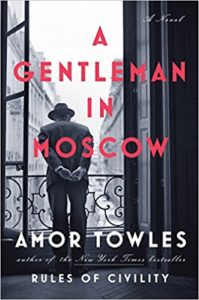
Hank Greely, Deane F. and Kate Edelman Johnson Professor of Law recommends Doctor Thorne, Framley Parsonage and The Small House at Allington by Anthony Trollope, War and Peace by Leo Tolstoy, The High Window by Raymond Chandler, Something Wicked This Way Comes by Ray Bradbury, I Contain Multitudes: The Microbes Within Us and a Grander View of Life by Ed Yong, and A Gentleman in Moscow by Amor Towles
“I’ve spent the last two months teaching at Stanford-in-Oxford: a remarkable experience at an amazing, and deeply bizarre, place. (I wonder if Stanford will be as weird in another 775 years?) I’ve been walking a lot in Oxford and its environs—the old buildings but also the surprising (to me) bounty of meadows, walks, and rivers. These books were great when I read them in California, but listening to them as audiobooks while walking around Oxford has been extraordinary: Anthony Trollope’s Barchester series. It helps to listen to them performed by Timothy West—a great reader. This trip I’ve listened to Dr. Thorne and Framley Parsonage and am starting The Small House at Allington, but all six books are wonderful.
“Earlier this year I finished (after three months) listening to War and Peace, which I had read 40 years ago. I’m not sure it’s summer reading, but it is truly great, for the history and for the people. The man could draw people, and families, and cultures, fantastically. I listened to the Maude translation, which is better (I think) than the somewhat prissy Constance Garnett version. The Pevear and Volokhonsky version has gotten great reviews (and I loved their Brothers Karamazov) but it translates the (frequent) French only in footnotes, which means there’s no audio book of it.
“Quick hits from books left at the faculty apartment at Oxford—Raymond Chandler’s The High Window (somehow I’d missed this novel—classic Chandler) and Ray Bradbury’s Something Wicked This Way Comes (which I’d read 48 years ago and didn’t get—a very scary story in, effectively, free verse).
“Finally, I’ll push a science book—Ed Yong’s I Contain Multitudes, on the wonders of the microbiome and, more broadly, the 95% + of live that is microbial.
“If you can stand to make my entry any longer, here’s one more sentence, to tack on to the end of the paragraph about War and Peace.
“For a lighter—and much shorter—look at some Russian/Soviet history, I found A Gentleman in Moscow by Amor Towles a very enjoyable read.”
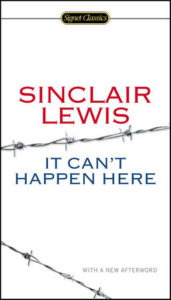
Deborah Hensler, Judge John W. Ford Professor of Dispute Resolution, Associate Dean for Graduate Studies, and
Director of Law and Policy Lab recommends It Can’t Happen Here by Sinclair Lewis, The Plot Against America, by Philip Roth, and How Democracies Die, by Daniel Ziblatt and Steven Levitsky.
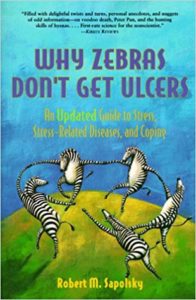
Erik Jensen, Professor of the Practice of Law, Director of Rule of Law Program recommends Why Zebras Don’t Get Ulcers by Robert Sapolsky
“My daughter (Stanford ’14) is always reading interesting books. During our winter-break family holiday this year she was reading Stanford neuroendocrinologist Robert Sapolsky’s Why Zebras Don’t Get Ulcers. To simplify, Sapolsky distinguishes between the episodic stress that zebras have when being chased by lions with the persistent stress that humans may endure because of job insecurity, poverty, racism and the like. In preparation for a Global Poverty and Law class that Dinsha Mistree and I taught for the first time during winter quarter I read a later paper that Sapolsky published in Scientific America entitled “Sick of Poverty.” This summer I’m going to take the time to read Why Zebras Don’t Get Ulcers.”
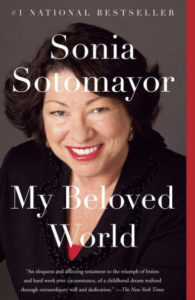
Pamela S. Karlan, Kenneth and Harle Montgomery Professor of Public Interest Law and Co-Director, Supreme Court Litigation Clinic recommends The Great War and Modern Memory by Paul Fussell, Regeneration, The Eye in the Door, and The Ghost Road by Pat Barker, Poetry of the First World War by Tim Kendall, Fire and Ashes: Success and Failure in Politics by Michael Ignatieff, My Beloved World by Sonia Sotomayor, and The Soft Vengeance of a Freedom Fighter by Albie Sach
“A couple of thoughts. This being the centennial of the end of World War I, I just re-read Paul Fussell’s The Great War and Modern Memory. It’s an amazing work about the poetry and literature that came out of the war. It inspired me also to reread a lot of that war’s poetry — the anthology Poetry of the First World War edited by Tim Kendall has a good array—as well as Pat Barker’s Regeneration trilogy: Regeneration, The Eye in the Door, and The Ghost Road. A century on, modern understanding has been powerfully shaped by the war.
“Three memoirs worth reading: Michael Ignatieff’s Fire and Ashes, by an unsuccessful Canadian politician; Sonia Sotomayor’s My Beloved World; and Albie Sach’s The Soft Vengeance of a Freedom Fighter. Each of them provides such a strong sense of the author. They’re absolutely nothing like the airbrushed, bland autobiographies of most politicians or judges.”
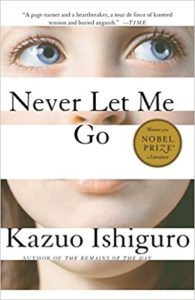
Amalia Kessler, Lewis Talbot and Nadine Hearn Shelton Professor of International Legal Studies, Professor by courtesy of History, and
Director, Stanford Center for Law and History recommends Never Let Me Go by Kazuo Ishiguro
“Just finished Never Let Me Go by Kazuo Ishiguro—haunting meditation on mortality, constraints imposed by society, and limits/dangers of technological utopianism.”
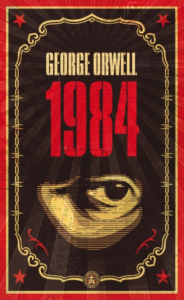
Michael McConnell, Richard and Frances Mallery Professor of Law and Director, Constitutional Law Center recommends Nineteen Eighty-Four by George Orwell
“I first read Nineteen Eighty-Four when I was in my late teens but had not read it since. After the election of Donald Trump, I started to hear lots of references to the novel, with dark suggestions that it is a commentary on our time. So I read it again. It is as brilliant and disturbing as I had remembered. And indeed it has a great deal more to say about our times than it did back then. On my youthful reading, the novel seemed to be mostly a commentary on the Soviet Union. Now it comes home. Perpetual war? Check. Surveillance through advanced technology? Check. Cults of personality around political figures? Check. Soul-sucking bureaucracy? Check. Re-writing of history? Check. Attacks on privacy? Check. But most of all I was struck by the idea of ‘thought crime’—that people would be publicly hated and excoriated for entertaining ideas and opinions contrary to mass opinion, without actually doing anything wrong. And ‘newspeak’—abrupt changes in the words we can say, with the purpose of controlling thought through language. And the “two minute hate” – where crowds of people suddenly express hatred for individuals who deviated from the social consensus. Social media, meet Big Brother. Who are our Winston Smiths?”
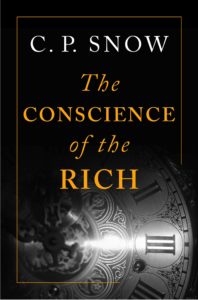
Deborah L. Rhode, Director of the Center on the Legal Profession, Program on Social Entrepreneurship, and the E.W. McFarland Professor of Law recommends The Conscience of the Rich by C.P. Snow
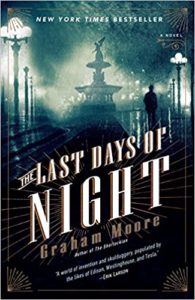
Dan William Reicher, Executive Director, Steyer-Taylor Center for Energy Policy and Finance Professor of the Practice of Law, recommends The Last Days of Night by Graham Moore
“The Last Days of Night by Graham Moore, Random House (2016). An historical novel about the battle to electrify the U.S. The story pits Thomas Edison against George Westinghouse, with co-starring roles played by Nikola Tesla and J.P. Morgan. Tying it all together, in a suspenseful legal battle, is a young Paul Cravath, of eventual New York law firm fame.”
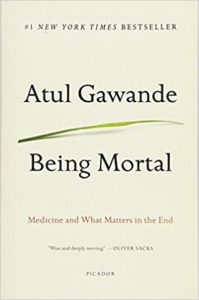
Deborah Ann Sivas, Luke W. Cole Professor of Environmental Law Director, Environmental and Natural Resources Law and Policy Program Director, Environmental Law Clinic Senior Fellow, Stanford Woods Institute for the Environment recommends The Distracted Mind: Ancient Brains in a High-Tech World by Adam Gazzaley and Larry Rosen, Being Mortal: Medicine and What Matters in the End by Atul Gawande.
“I just read The Distracted Mind: Ancient Brains in a High-Tech World, co-authored by a neuroscientists and a cognitive psychologist. Based on evolutionary biology, authors Adam Gazzaley and Larry Rosen proffer a theory for why we are so easily distracted—our brains literally forage for information the way some species forage for acorns. And in a world of information overload, the ever-present promise of novelty undermines our ability to stay on task toward our goals. Each shiny new technology increases the siren’s song of distraction, with the constant vibrating of that iPhone in our pocket posing the greatest challenge yet. The science laid out in detail by the authors confirms our lived experience that ping-ponging back and forth between tasks—euphemistically called “multitasking”—is suboptimal in just about every possible way. Unfortunately, the authors cannot provide easy answers to the dilemma that contemporary humans face, although the last few chapters take a stab at providing some rather obvious behavioral suggestions. But the book’s real value, in my mind, is pulling back the curtain on the science behind the patterns into which we unwittingly and helplessly seem to fall every single day. Awareness of the phenomenon is half the battle.
“In dealing with some family issues this year, I also recently reread Atul Gawande’s Being Mortal: Medicine and What Matters in the End. As someone said to me a few years back when I read it the first time, every living person should read this book. I couldn’t agree more. Although the heartfelt stories of aging, illness, and decline sometimes left me feeling melancholy, in the end Gawande’s message about facing the future with eyes wide open was oddly reassuring. And he’s an excellent writer.”
